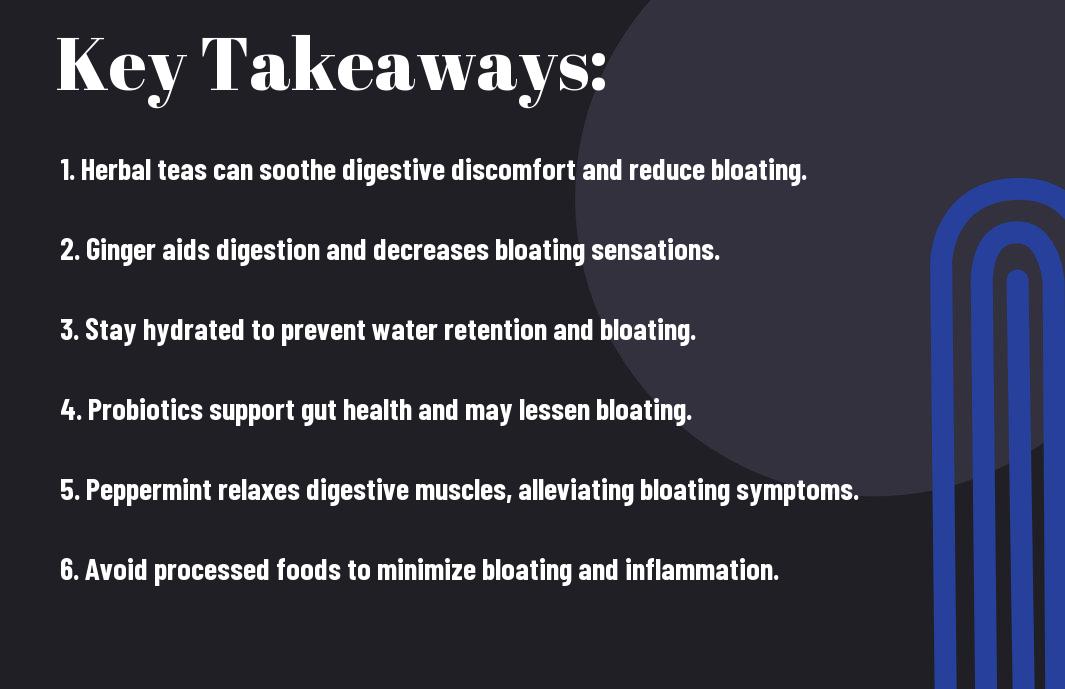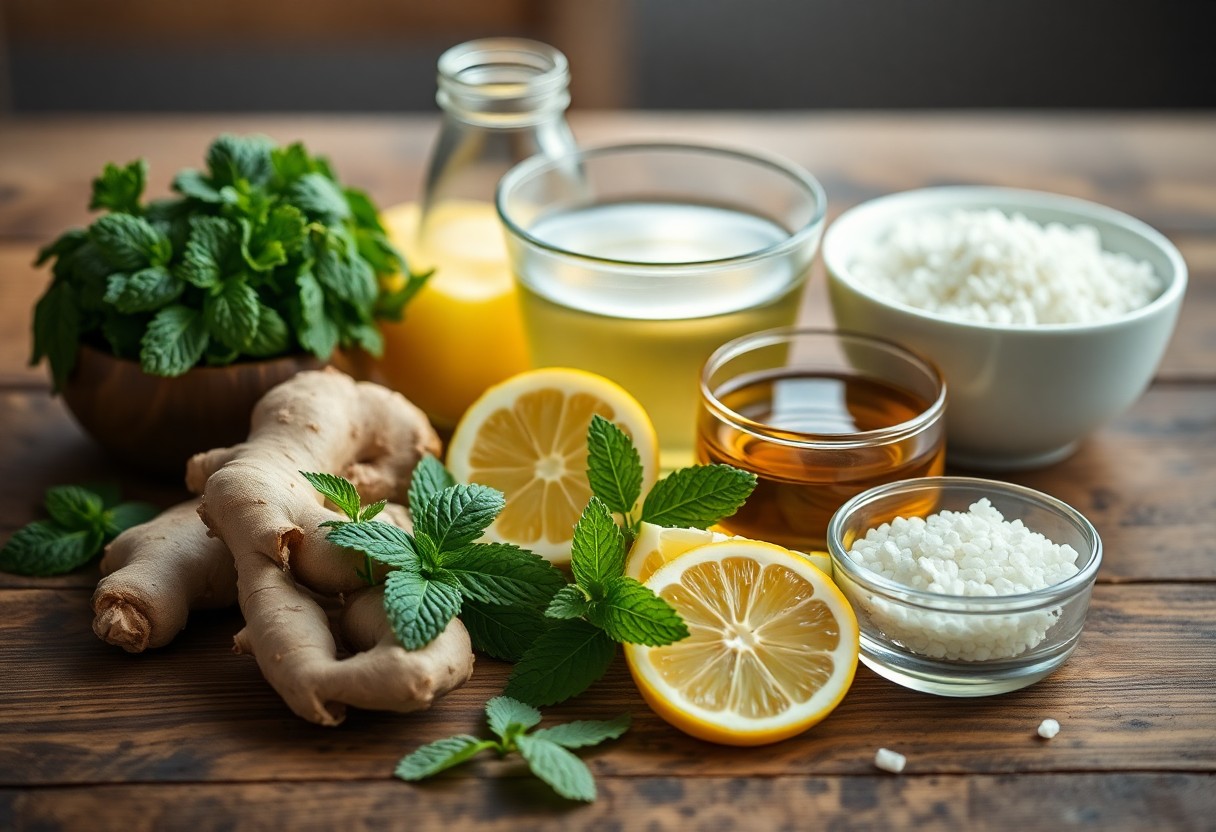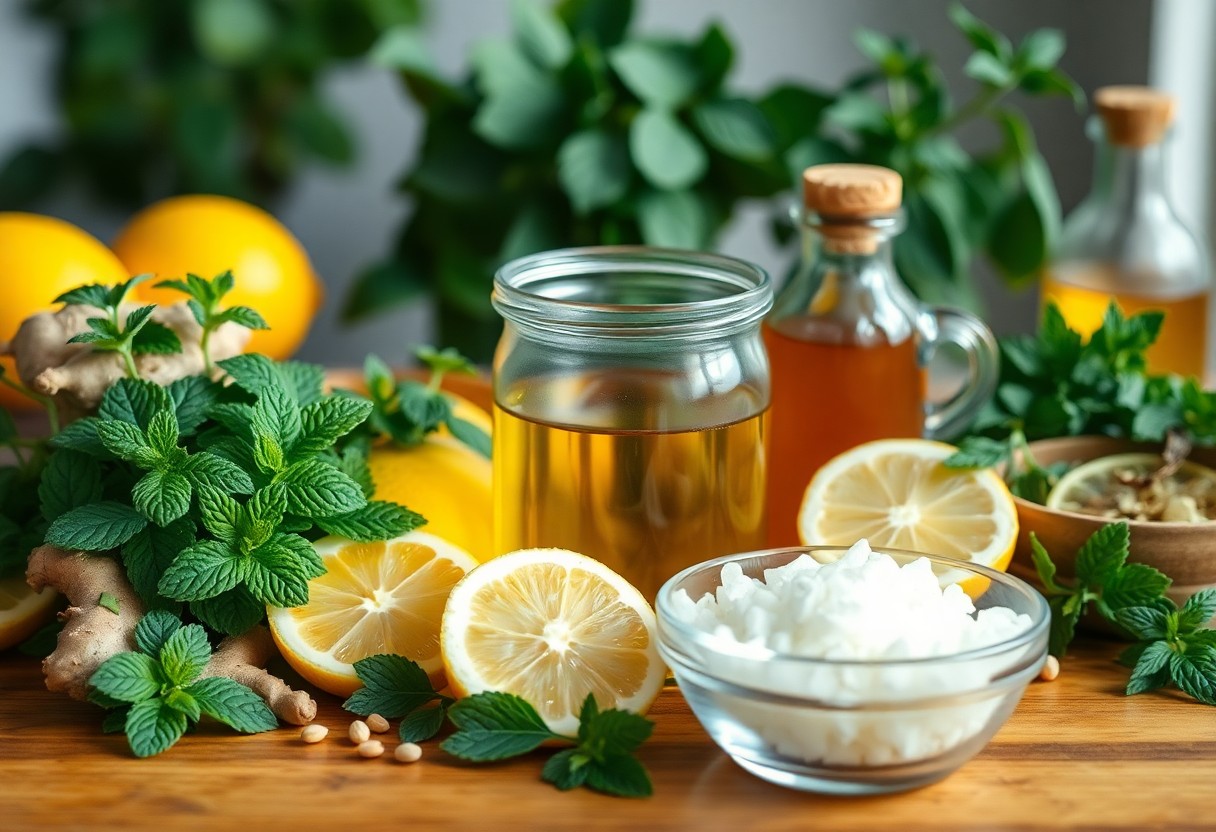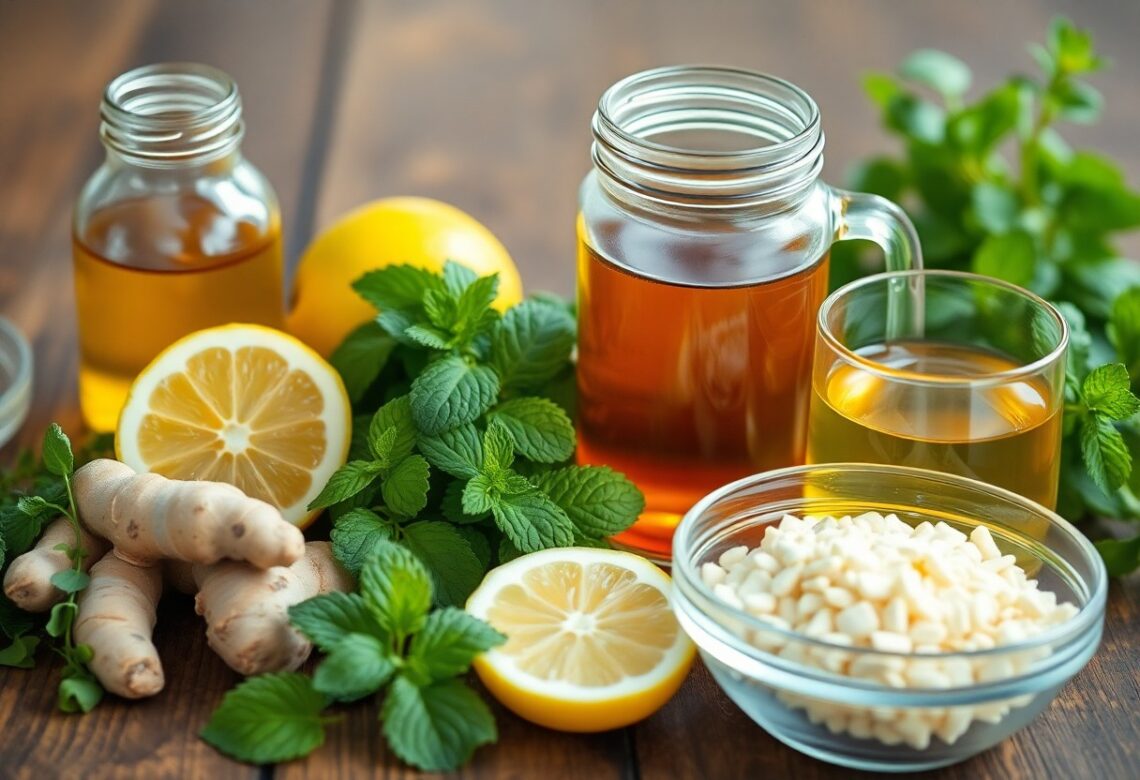Many individuals struggle with bloating that can impede your weight loss journey. This discomfort, often caused by dietary choices or lifestyle habits, can lead to frustration and discouragement. Fortunately, there are several effective natural remedies you can incorporate into your routine to alleviate bloating and support your weight loss efforts. In this blog post, you’ll explore various strategies, from dietary adjustments to simple lifestyle changes, aimed at improving your digestive health and enhancing your overall sense of well-being.
Key Takeaways:
- Herbal Teas: Consuming peppermint or ginger tea can help relieve bloating and support digestion.
- Probiotics: Incorporating probiotic-rich foods like yogurt or kimchi can enhance gut health and reduce bloating.
- Water Intake: Staying hydrated aids in digestion and can combat water retention that contributes to bloating.
- Fiber-Rich Foods: Foods such as fruits, vegetables, and whole grains can promote regular bowel movements and decrease bloating.
- Apple Cider Vinegar: A small amount before meals may help improve digestion and reduce feelings of bloating.
- Avoiding Carbonated Drinks: Reducing or eliminating soda and sparkling beverages can prevent excess gas and bloating.
- Mindful Eating: Slowing down while eating and chewing food thoroughly can improve digestion and minimize bloating.
Understanding Bloating
To grasp the challenges of weight loss, you need to understand what bloating is. This condition is often characterized by a feeling of fullness, tightness, or swelling in your abdomen, typically after eating. Bloating can affect your comfort level and self-image, making it vital to identify its sources and explore potential remedies. By addressing bloating, you can enhance your weight loss journey and overall well-being.
Causes of Bloating
Between diet choices, lifestyle habits, and individual health factors, various elements can lead to bloating. Foods high in fiber, carbonated drinks, and certain dairy products are common culprits. Additionally, eating too quickly or experiencing stress may exacerbate bloating. Identifying these triggers will help you manage symptoms effectively, allowing for a smoother weight loss experience.
How Bloating Affects Weight Loss
Among the many obstacles you may face on your weight loss journey, bloating can significantly impact your results. It can create a false sense of fullness, making it hard for you to distinguish between hunger and discomfort. This may lead to inconsistent eating patterns and hinder your motivation. Tracking your diet and eliminating bloating triggers can help you regain control and stay focused on your goals.
Indeed, addressing bloating is vital because it can affect your perception of progress in weight loss. When you’re bloated, you may feel heavier and less motivated to continue your regimen. Moreover, persistent bloating might lead to weight stagnation or fluctuations, making success seem elusive. By understanding how to reduce bloating and its impact on your body, you can create a more positive environment for achieving your weight loss objectives.


Natural Remedies for Bloating
Some effective natural remedies for bloating include dietary adjustments, lifestyle changes, and incorporating specific herbal supplements. You can explore these options further in this resource about 19 Home Remedies for Bloating. These remedies can help alleviate uncomfortable bloating and improve your digestive health.
Herbal Teas
Beside dietary changes, herbal teas can be an excellent way to soothe your digestive system. Teas such as peppermint, ginger, and chamomile are known for their anti-inflammatory and soothing properties, helping to relieve bloating and gas. Enjoying a warm cup after meals can aid digestion and promote relaxation.
Probiotics
Across various diets, probiotics play an important role in supporting digestive health. These beneficial bacteria help balance your gut flora and can improve overall digestion, which may reduce feelings of bloating. Including probiotic-rich foods such as yogurt, kefir, and fermented vegetables in your diet is a great way to support your gut health.
This attention to probiotics can also play a role in weight management, as a healthy gut microbiota is linked to better digestion and absorption of nutrients. By incorporating probiotics into your routine, you may experience less bloating and better overall digestive comfort, encouraging a more enjoyable eating experience.

Dietary Changes to Alleviate Bloating
Once again, making dietary adjustments can significantly aid in relieving bloating. Consider incorporating foods that are easier on your digestive system while steering clear of those that may provoke discomfort. For more ideas, explore this article on 18 ways to reduce bloating: Quick tips and long-term relief.
High-Fiber Foods
To effectively reduce bloating, you should focus on incorporating high-fiber foods into your diet. Foods such as leafy greens, legumes, and whole grains promote healthy digestion and prevent constipation, which can contribute to bloating.
Foods to Avoid
To alleviate bloating, you might also want to steer clear of certain foods. Foods that are high in sugar, processed carbs, and excessive salt can lead to water retention and digestive discomfort. Additionally, carbonated drinks and certain artificial sweeteners are known culprits that can exacerbate bloating.
HighFiber foods such as beans, lentils, and oats are fantastic for digestion. However, if you are not used to a fiber-rich diet, you should gradually introduce these foods to avoid sudden bloating. Some others, like dairy products and cruciferous vegetables, may cause discomfort for some individuals due to their specific digestive sensitivities, so it’s imperative to pay attention to your body’s reactions.

Hydration and Its Role in Reducing Bloating
Now, staying properly hydrated is necessary for managing bloating effectively. When you drink enough water, it helps to flush out excess sodium from your body, which can contribute to water retention and discomfort. Additionally, increasing your fluid intake supports digestion and can reduce constipation, helping you feel lighter and more comfortable. Aim for at least eight glasses of water a day, and consider incorporating herbal teas that soothe the digestive system for added benefits. By prioritizing hydration, you can take an important step toward minimizing bloating in your daily routine.
Physical Activities that Help Relieve Bloating
Many physical activities can help relieve bloating and promote better digestion. Gentle exercises like walking or yoga can stimulate your digestive system, reducing gas and discomfort. Incorporating stretches, such as knee-to-chest and spinal twists, can also ease tension in your abdomen. Additionally, engaging in more intense workouts like cycling or swimming can enhance your overall metabolism and promote bowel movement. Listen to your body, and opt for activities that feel good for you, as consistent movement is key to alleviating bloating effectively.
Mindfulness and Stress Reduction Techniques
All stress can contribute to bloating and weight gain, making mindfulness and stress reduction techniques necessary for your wellness. By incorporating practices such as meditation, deep breathing, or yoga into your daily routine, you can significantly reduce stress levels. These techniques help you become more aware of your body, allowing you to recognize how stress affects your digestive system. As you cultivate mindfulness, you’ll find it easier to make healthier choices and listen to your body’s signals, promoting a more balanced relationship with food and supporting your weight loss journey.
Summing up
Following this guide on natural remedies for weight loss and bloating, you can take effective steps towards enhancing your digestive health and achieving your goals. Incorporating herbal teas, increasing fiber intake, and staying hydrated can significantly alleviate bloating and assist with weight management. By being mindful of your diet and making simple lifestyle adjustments, you empower yourself to feel lighter and more energized. Embrace these natural strategies to improve your well-being and reach your weight loss objectives in a healthier way.
FAQ
Q: What are natural remedies for reducing bloating associated with weight loss?
A: Natural remedies for alleviating bloating include herbal teas, such as peppermint or ginger tea, which can aid digestion. Consuming probiotic-rich foods like yogurt or kefir may help maintain gut health. Additionally, incorporating diuretic foods like cucumbers and asparagus can reduce water retention that contributes to bloating.
Q: How does hydration help with bloating during weight loss?
A: Staying well-hydrated is imperative for overall health and can actually help reduce bloating. Drinking water helps flush out excess sodium from the body, reducing water retention. It also promotes healthy digestion and can alleviate feelings of fullness associated with bloating.
Q: Are there specific foods to avoid if experiencing bloating while trying to lose weight?
A: Yes, certain foods can exacerbate bloating, especially those high in sugar, processed carbohydrates, and trans fats. Particularly, beans, lentils, carbonated drinks, and foods containing artificial sweeteners may cause discomfort. Keeping a food diary can help identify specific triggers for individual responses to different foods.
Q: Can physical activity help with bloating during a weight loss journey?
A: Engaging in regular physical activity can significantly aid in reducing bloating. Exercise improves digestion and helps move gas through the digestive tract, relieving bloating. Activities such as walking, yoga, and stretching can be particularly effective in easing discomfort.
Q: What role does fiber play in addressing bloating while losing weight?
A: Fiber is important for digestive health and can help regulate bowel movements, thus minimizing bloating. However, it’s imperative to increase fiber intake gradually to avoid sudden digestive discomfort. Eating whole grains, fruits, and vegetables can support healthy digestion and reduce feelings of fullness associated with bloating.
Q: How do stress management techniques contribute to reducing bloating?
A: Stress can negatively impact digestion, leading to bloating and discomfort. Implementing stress management techniques, such as mindfulness practices, meditation, or deep-breathing exercises, can promote relaxation and improve digestive health. Reducing stress can, therefore, help in minimizing bloating during weight loss.
Q: Are there specific herbal supplements that can help reduce bloating?
A: Certain herbal supplements may assist in alleviating bloating. For example, fennel seed, dandelion root, and artichoke extract have been known to support digestive health and reduce gas. However, it’s wise to consult with a healthcare provider before starting any new supplements, especially during weight loss efforts.





